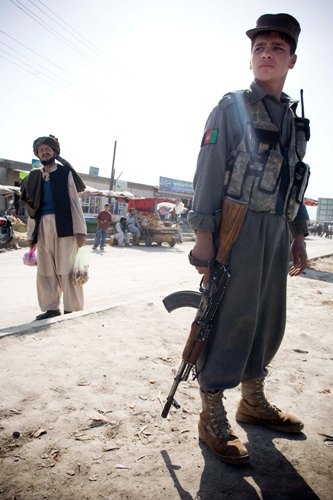
A new multi-million dollar strategy, with the impressively bland title Afghan Social Outreach Program, has just been approved by Afghanistan's President Hamid Karzai. ASOP, funded by the Pentagon and based on The Awakening program in Iraq, will deliver radios, phones, and large amounts of cash to tribal elders as a bribe to work with government officials and not with the Taliban. (Apparently, there is also a necessity to hand out even more weapons -- the country is lousy with them, but we always need another gun).
ASOP will work in Afghanistan's vast and rugged rural terrain, where most of the country's 31 million people live, usually in abject poverty and fear. The porous landscape, which can soak up and "disappear" insurgents quicker than you can turn over an APC engine, is one of the major enemies in the war against the Taliban -- a strategic nightmare for patrolling troops.
The aim of ASOP is to mobilize elected village officials into bases to ward off insurgents, creating solid blocs of law and order, and to send intelligence of Taliban activity directly to Kabul. Tribal chiefs and senior clerics will also select local men to form militias, which will be armed and trained.
With violence soaring -- the last 12 months has seen more Afghans and foreign troops killed and more suicide bombings and kidnapping than any other year since the start of the war -- senior NATO and Afghan officials defend the move. They cite growing rural despair and the entreaties of senior Taliban members who want to defect to the government, and who will be part of this new move to reconcile villages held by the Taliban.
 David Lang
David Lang
Mr. Jelani Popal, head of the Independent Directorate of Local Governance, which reports directly to President Karzai, will oversee ASOP. He knows what he's up against. In addition to the Taliban, he says, "there is a problem of corruption, warlords and the drug mafia." Mr. Popal wants to fight against the grinding poverty and lawlessness that characterizes most rural people's lives, and he acknowledges that such issues alienate people from their government -- and lead them into the arms of the Taliban.
Law and order is a major concern in Afghanistan -- and those who are charged with protecting it fail miserably almost 100% of the time. The Afghan National Police (ANP) force may not be the most corrupt in the world, but it is certainly tilting for the title. (I was in Mazar e Sharif recently working with a local journalist on a story about police taking bribes of one and two cents from local indigent beggars at the mosque.)
With few credentials needed to become a beat cop -- no formal education qualifications and just eight weeks training -- the police are a good landing ground for those desperate for work and desperate for cash.
It is not the police force's job to do counter-insurgency work. As the International Crisis Group said in the recent damning report on the Afghan police force: "Too much emphasis is still placed on using the police to fight the insurgency rather than crime. The ANP is ill equipped for this role and has been targeted by the Taliban, with 1,200 killed in 2007 and a similar toll expected in 2008. The goal of the Afghan government and the international community should be a national police force able to uphold the rule of law, and thereby help tackle the root causes of alienation that drive the insurgency."
But is a poorly trained militia, consisting of young men from high-unemployment areas with no official government role really the answer?